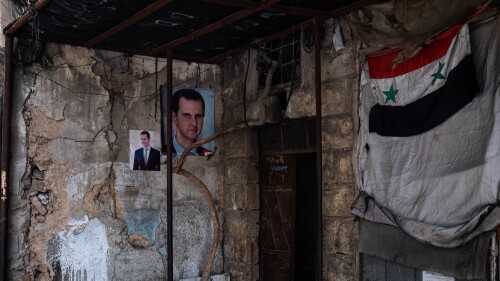Notwithstanding the economic agreement signed this week, the peace process between the Palestine Liberation Organization (PLO) and Israel is in very bad shape, so bad that it may be on its way to failure. I see three main causes for this sorry impasse.
First, the Israeli leadership of Yitzhak Rabin and Shimon Peres has shown itself to be a poor bargainer. Weary of the struggle, hoping to assure that their grandchildren will not have to fight their whole lives long, seeking their own place in the history books, these old warriors are playing a week hand. Eloquent talk of Israel’s need to end its decades-long battle with the Arabs directly undercuts the Israeli negotiating position, revealing to the Palestinians a desperate need to offload the West Bank and Gaza Strip. Yasir Arafat senses this urgency and fully exploits it.
For example, he solemnly and publicly assured the Israelis in August 1993 that he would change the PLO Charter, eliminating its many references to destroying Israel. But he took not a single step in this direction. The Israeli leadership not only did not call him to task on the matter, but Foreign Minister Peres even apologized for Arafat, saying the offensive portions of the Charter are “just words.” Remembering how every Israeli government through two decades refused to have anything to do with the PLO before its Charter was changed, this astonishing concession early on signaled Arafat that he could get away with almost anything.
And so he has. Back in September, he promised to stop the terrorism against Israelis. But his aide Yasir ‘Abd Rabbu called for the intifada to go on, directly contradicting Arafat’s promise to call on Palestinians to reject violence and terrorism. Eight months later, Arafat not only ignores his earlier pledge, but he is brazenly forming an alliance with Hamas, the radical fundamentalist Muslim organization that has overtly uses terrorism against Israelis to foil the peace process.
Second, the peace process is failing due to inherent problems of negotiating peace between a democracy and a dictatorship. As Douglas Feith recently pointed out in a talk at the Heritage Foundation, Israel faces several perils in common with a Great Britain negotiating with Nazi Germany in the 1930s or a United States with the Soviet Union in the 1970s. Note these patterns in common:
- The democratic leadership becomes hostage to diplomacy, forced to defend the trespasses of the dictatorial opponent. Just as Henry Kissinger became Moscow’s defense attorney, Peres makes excuses for the PLO not changing its Charter. Indeed, Peres even admits that he “has become an attorney for the speeches of Arafat.”
- The democratic side fulfills the letter and spirit of its agreements, while the dictatorial side plays fast and loose. There being no external authority to enforce compliance of an international accord, it depends on internally-generated pressure. Israelis insist that their government live by agreements signed but there is no equivalent monitor on the PLO side. This situation makes it easy for the PLO not to fulfill its obligations.
- Democracies understand law as a means of ordering society, while autocracies see it as a way to enforce their will. The Declaration of Principles offers Israelis as a way to end their conflict with Palestinians; in contrast, it provides the PLO with a new mechanism to pursue that conflict.
In short, Jerusalem seems unlikely to do better than London or Washington in its efforts to negotiate with a dictatorship. Third, the character of the PLO causes the peace process to falter. An organization that has always relied on duplicity continues to do so. PLO leaders keep saying things which specifically contradict their agreement with Israel: According to Arafat, the September accord means a Palestinian flag will fly over Jerusalem (implying Palestinian sovereignty over that city); of course, it says nothing of the sort but leaves the issue of Jerusalem to a later date. ‘Abd Rabbu has said that the accord permits all 800,000 Palestinians who left the West Bank and Gaza to return there, which it does not.
In other words, though the whole world witnessed the signing of the Declaration of Principles at the White House last September, the PLO acts as though it were a draft document to be improved on through further bargaining.
Optimists often point to the German-French rapprochement after World War II, as an example of age-old enemies making peace, and argue that it shows Palestinians and Israel can also bury their differences. Fair enough: but it’s important to note that the Germans renounced their aggressive ways not after the partial defeat of World War I but after the total defeat they experienced under Hitler. Keeping this analogy in mind, the Palestinian mood today far more closely resembles that of Germany in 1918 than in 1945. Note that Hamas, which explicitly seeks the destruction of Israel, is growing in strength. As for the PLO, it recognized Israel in a moment of extreme weakness; nothing in its words or actions suggests its leadership has had a change of heart. Quite the contrary, as new instances of PLO behavior come to light, it becomes clear that the old goal of extirpating Jewish sovereignty remains alive.
Last September, a skeptical observer could hope that the PLO would turn into a reliable negotiating partner. Eight months of public negotiations have revealed it to be the same group of liars and murderers it has always been. That record makes it nearly inconceivable that the PLO will be a party to ending the conflict between Palestinians and Israelis.
For Israel, signing agreements with the PLO is the easy part; getting the PLO to live up to its commitments will be the great challenge.







